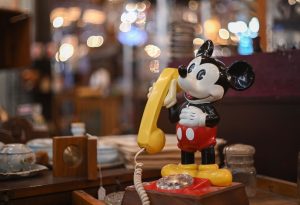Legal Blog
Behind the Headlines: Understanding the Nuances of Mickey Mouse’s Public Domain Status
 Public Domain Day is a relatively new celebratory event observed on January 1. The purpose of this day is to celebrate the entry of works that were protected by copyright into the public domain.
Public Domain Day is a relatively new celebratory event observed on January 1. The purpose of this day is to celebrate the entry of works that were protected by copyright into the public domain.
Before Public Domain Day, articles routinely appear reporting on the works entering the public domain name. In recent years, works entering the public domain have included The Great Gatsby (which became the basis for a musical that is likely heading to Broadway), The Jazz Singer, Metropolis, and Winnie-the-Pooh.
Before this year’s Public Domain Day, articles heralded Mickey Mouse entering the public domain. The implication, of course, is that Mickey Mouse will thus be free for everyone to use — after all, isn’t that what it means when something enters the public domain? Not necessarily.
Mickey Mouse is not necessarily entering the public domain, but his first appearances in two shorts, Steamboat Willie and Plane Crazy, are. Anyone wanting to use Steamboat Willie or Plane Crazy is free to do so. Either (or both) can be shown without permission from or the need to pay royalties to Disney.
The same may be true of the version of Mickey Mouse shown in Steamboat Willie and Plane Crazy. That version of Mickey Mouse is in black and white, does not speak, and does not wear red pants. However, like many other well-known characters (Sherlock Holmes and James Bond, for example), Mickey Mouse has changed over time and has traits and characteristics that are still protected by copyright; only the earliest works featuring Mickey Mouse are now in the public domain. So, Mickey Mouse, as he appeared in Fantasia, is still off-limits. This is why the trailer for the recently announced slasher film Mickey’s Mouse Trap uses the Steamboat Wille version of Mickey Mouse as its villain. The survival horror game Infestation:
Origin also features the Steamboat Wille version of Mickey Mouse as its villain. That version of Mickey Mouse also appears set to be the villain in another recently announced untitled horror film.
There is another reason Mickey Mouse is not free for everyone to use. Mickey Mouse is undeniably a symbol of Disney, and a consumer seeing goods or services being offered in conjunction with Mickey Mouse is likely to believe that those goods or services are associated with or endorsed by Disney. In other words, Mickey Mouse functions as a trademark. Indeed, Disney has multiple trademark registrations for Mickey Mouse (and for Minnie, Goofy, Pluto, Donald, and many other characters), and any effort to use Mickey Mouse to indicate the source of a product or service will likely be met with a claim of trademark infringement. Moreover, Walt Disney Animation Studio adopted a clip from Steamboat Willie as its logo, strengthening its ability to claim the early version of Mickey Mouse as a trademark.
Practical considerations will also limit the availability of Mickey Mouse. Disney is no stranger to litigation and is positioned to impose significant costs on anyone it believes is using more of Mickey Mouse than they are entitled to use. In fact, Disney may very well seek out cases to litigate to concretely establish the scope of its rights in Mickey Mouse (the estate of Sir Arthur Conan Doyle did this with respect to Sherlock Holmes, resulting in a ruling in 2014 that at the time, certain of Holmes’ characteristics are in the public domain and that certain of his characteristics are not).
So, while we can celebrate the entry of Steamboat Willie and Plane Crazy into the public domain, one shouldn’t assume that Mickey Mouse is likewise now in the public domain. The only sure thing to come from such an assumption is litigation, as it has been reported that Disney has announced its intention to continue to protect its rights.
If you have any questions about using Steamboat Willie, Plane Crazy, or any other work that is in the public domain, reach out to Offit Kurman’s intellectual property group for a consultation.
ABOUT MARC MISTHAL
 |
|
Marc P. Misthal is a principal attorney in the firm’s Intellectual Property practice group. With a wide range of clients worldwide, Marc provides counsel to businesses spanning diverse industries, including the fashion, apparel, computer technology, hospitality, restaurant, entertainment, jewelry, luxury goods, home goods, furniture, cosmetics, retail and consumer goods industries.
As part of his practice, Marc has represented clients in federal courts around the country, defending and prosecuting claims of trademark, trade dress, and copyright infringement and, when necessary, obtaining injunctive relief. He has also represented clients in Opposition and Cancellation proceedings before the U.S. Patent and Trademark Office (USPTO) and in proceedings under the Uniform Domain Name Dispute Resolution Policy (UDRP).
